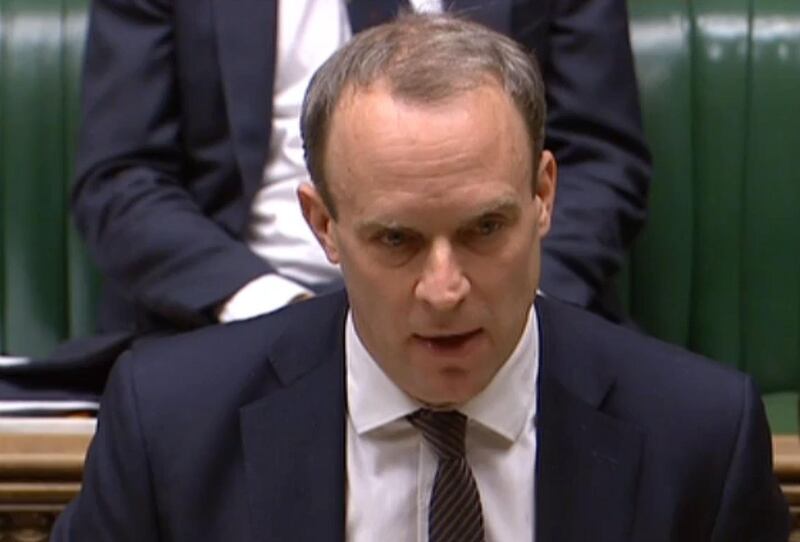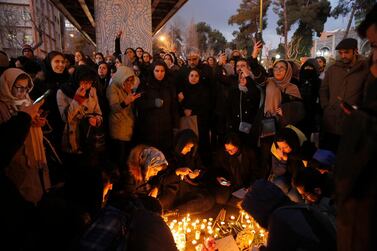Britain’s foreign minister has hit out at Iran over its decision to flout the 2015 nuclear deal saying Tehran’s “systematic failure to comply” had left it a “shell of an agreement”.
Dominic Raab, answering an urgent question in UK parliament over escalating regional tensions, said the UK still “fully supports” a diplomatic solution with Iran but cast doubt over the possibility of reconciliation.
The UK foreign secretary spoke as the Iranian ambassador to the UK met with Britain’s Middle East minister after a summons over the detention of Britain’s envoy to Tehran.
The Iranian ambassador Hamid Baeidinejad met with Britain's Middle East Minister Andrew Murrison at 4pm London time. The summons followed the detention of Britain's own Ambassador Rob Macaire in Tehran on Saturday, a Foreign Office spokesman confirmed to The National.
The British diplomat was held in the Iranian capital and later released after attending a vigil for the 176 victims of a Ukrainian passenger jet, shot down in Iran last week by accident.
Following the meeting Mr Murrison said: "The arrest of our Ambassador to Iran was a flagrant violation of international law and it is important that Iran understands how seriously we take this matter. It must not be allowed to happen again; I made that clear to the Iranian Ambassador this afternoon.
"We reiterate the importance of a full and transparent investigation into Ukraine International Airlines flight 752. The loss of life in the crash was a tragedy and we express our condolences to the people of Iran as they grieve those who died."
Mr Murrison requested assurances for the safety of British embassy staff in Iran during the meeting.
European nations, in particular, have handled Tehran with kid gloves in the wake of the deadly plane crash. Ukraine – it has emerged – held back from pointing the finger at Iran despite evidence it had found of a likely anti-aircraft missile hit against the commercial flight.
However, Mr Raab was unequivocal in his criticism and called the detention a “flagrant violation”. He said Britain would seek an apology from Mr Baeidinejad.
Sweden itself has summoned the Iranian ambassador to the Stockholm over questions relating to the downed Ukrainian flight. Ukraine’s Foreign Minister said on Monday representatives from the “grieving nations” – Britain, Canada, Sweden, Iran and the Ukraine - would meet in London to discuss the downing of Flight 572.
European nations have scrambled to respond to escalating tensions between the United States and Iran following the killing of Iranian General Qassem Suleimani in an American drone strike earlier this month.
Britain, Germany and France in particular have stuck to the 2015 deal, in which Iran agreed to give up its nuclear programme for sanctions relief, in the face of the recent crisis.
However, Donald Trump’s aggressive response towards Iran has exposed the weakness of European nations’ efforts to preserve the nuclear deal, experts have said.
The reality on the ground was a “long, long way” from the UK’s policy of four years ago towards Iran, said Prof Malcolm Chalmers, the deputy director general of the Royal United Services Institute (RUSI), a London-based think-tank.
The leaders of Britain, France and Germany late on Sunday urged Iran to return to full compliance with the Barack Obama-era agreement that his successor dumped in 2018. Iran on Sunday announced plans to further breach the accord by ignoring the limit on the number of centrifuges it could use to make enriched uranium.
In a joint statement on Sunday, the three European allies urged Iran to “reverse all measures inconsistent with the agreement and return to full compliance.”
Analysts said on Monday the statement failed to recognise that the assassination of Qassem Suleimani had fundamentally altered Iran’s position in the Middle East and its control of proxies in the region.
The three European countries had been mindful of keeping a united front as the UK prepares for a post-Brexit future after January 31 with a foreign policy that could diverge from the European Union.
The three countries appeared in the first 48 hours of the Suleimani killing to be taking different approaches with UK remaining largely silent.
French President Emmanuel Macron consulted Russian president Vladimir Putin before warning that US action could escalate the crisis, said Dr Jonathan Eyal, the international director at RUSI.
“It’s completely unimaginative,” Dr Eyal said of the joint statement by the three European countries, known as the E3.
“Privately they would admit it’s difficult to see how the JCPOA [the Iran nuclear deal] would be reinstated even if a Democratic president was inaugurated in January 2021,” he said. “It’s the sort of mantra that keeps the E3 together.”







